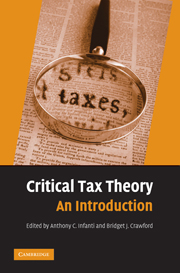Book contents
- Frontmatter
- Contents
- List of Illustrations
- List of Tables
- List of Contributors
- List of Common Abbreviations
- Introduction
- CHAPTER 1 FOUNDATIONS OF CRITICAL TAX THEORY
- CHAPTER 2 HISTORICAL PERSPECTIVES ON TAXATION
- CHAPTER 3 THE GOALS OF TAX POLICY
- Racial Equality in the Twenty-First Century: What's Tax Policy Got to Do with It?
- Discursive Deficits: A Feminist Perspective on the Power of Technical Knowledge in Fiscal Law and Policy
- The Hidden Costs of the Progressivity Debate
- Tax Equity
- Tax Policy and Feminism: Competing Goals and Institutional Choices
- CHAPTER 4 CRITICAL TAX THEORY MEETS PRACTICE
- CHAPTER 5 RACE AND TAXATION
- CHAPTER 6 GENDER AND TAXATION
- CHAPTER 7 SEXUAL ORIENTATION AND TAXATION
- CHAPTER 8 THE FAMILY AND TAXATION
- CHAPTER 9 CLASS AND TAXATION
- CHAPTER 10 DISABILITY AND TAXATION
- CHAPTER 11 GLOBAL CRITICAL PERSPECTIVES ON TAXATION
- CHAPTER 12 CRITICAL PERSPECTIVES ON CRITICAL TAX THEORY
- Index
Racial Equality in the Twenty-First Century: What's Tax Policy Got to Do with It?
Published online by Cambridge University Press: 04 August 2010
- Frontmatter
- Contents
- List of Illustrations
- List of Tables
- List of Contributors
- List of Common Abbreviations
- Introduction
- CHAPTER 1 FOUNDATIONS OF CRITICAL TAX THEORY
- CHAPTER 2 HISTORICAL PERSPECTIVES ON TAXATION
- CHAPTER 3 THE GOALS OF TAX POLICY
- Racial Equality in the Twenty-First Century: What's Tax Policy Got to Do with It?
- Discursive Deficits: A Feminist Perspective on the Power of Technical Knowledge in Fiscal Law and Policy
- The Hidden Costs of the Progressivity Debate
- Tax Equity
- Tax Policy and Feminism: Competing Goals and Institutional Choices
- CHAPTER 4 CRITICAL TAX THEORY MEETS PRACTICE
- CHAPTER 5 RACE AND TAXATION
- CHAPTER 6 GENDER AND TAXATION
- CHAPTER 7 SEXUAL ORIENTATION AND TAXATION
- CHAPTER 8 THE FAMILY AND TAXATION
- CHAPTER 9 CLASS AND TAXATION
- CHAPTER 10 DISABILITY AND TAXATION
- CHAPTER 11 GLOBAL CRITICAL PERSPECTIVES ON TAXATION
- CHAPTER 12 CRITICAL PERSPECTIVES ON CRITICAL TAX THEORY
- Index
Summary
In 1976, Supreme Court Justice Byron White recognized that tax statutes may have a disparate impact based upon race. You may ask how this is possible given that the Code is race-neutral on its face. There is nothing in the Code that explicitly says blacks pay more, whites pay less. This is still America – isn't it? I submit, because this is America, one could intuitively expect to observe racial disparities in the implementation of our federal tax laws, which date back to the Sixteenth Amendment and the Revenue Act of 1913.
CURRENT TAX POLICY AND RACE DISCRIMINATION IN THE LABOR MARKET
My charge was to suggest a change in the Code that would work toward the goal of achieving racial equity in the twenty-first century. I believe there is no greater culprit that prevents the achievement of racial equality in this country than the systemic racism found throughout the paid labor market. My proposal therefore will be to use the federal tax laws to disrupt the wage discrimination faced by workers of color.
I would like to begin by giving you some background statistical information that I suspect is all too familiar. For 1995, the Census Bureau reported median weekly earnings for white males, of $566, for black males $411, for black females $355, for Hispanic males $350, for Hispanic females $305. The unemployment rate for whites was 4.9% for 1995, for blacks was 10.4%, for Hispanics 9.3%.
- Type
- Chapter
- Information
- Critical Tax TheoryAn Introduction, pp. 42 - 45Publisher: Cambridge University PressPrint publication year: 2009
- 2
- Cited by



